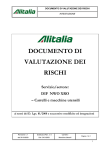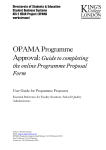Download Document Title Delegated Authority – User Guide Document
Transcript
Document Title Delegated Authority – User Guide Document Category Guidelines/User Guide Document Ref Status Version Number V1.0 Revised Reason for development Clarification of delegation arrangements Scope This procedure applies to: All staff Executive Summary The guidance provides context and background to the delegation scheme and a detailed user guide covering specific examples. Author /developer Owner Head of Governance Services Unit Assessment • • • • Head of Governance Services Unit Equality Impact Assessment (mandatory) Legal Information Governance Academic Regulation Consultation (where relevant) Executive, Directors/Heads of Support Division Authorised by (Committee, School or PAS) Nominations and Governance Committee of Council Date: 3 November 2011 Effective from Start date October 2011 Review due October 2013 Document location Governance Services website Document Dissemination / Communications Plan To be discussed with Registrar and Secretary Document Control All printed versions of this document are classified as uncontrolled. A controlled version is available from the University Policy pages on the University of Salford website. INDEX Page Delegated Authority; User Guide – Content and Background 3 Delegated Authority; User Guide 9 Appendix A – Financial Delegation 20 Appendix B – Senate Scheme of Delegation 26 Appendix C – List of Acronyms 27 Appendix D – Academic and Corporate Governance Structure – diagrams 28 Page 2 of 29 DELEGATED AUTHORITY; USER GUIDE – CONTEXT AND BACKGROUND 1. 2. Council’s formal objects and powers are set out in sections 3 and 4 (respectively) of the Charter as set out below; “S.3. The objects of the University shall be to advance education and knowledge by teaching and research, and in doing so to foster an academic environment which is enterprising and applied to business and the professions, for the benefit of society at large. S.4. The University shall be a teaching and an examining body and shall have the following powers: (a) To award degrees and other academic awards and to withdraw such awards; (b) To acquire, own, maintain, manage and dispose of real and other property; (c) To solicit, receive and administer fees, grants, subscriptions, donations, endowments, legacies, gifts and loans of any property whatsoever whether real or personal; (d) To act as trustees for and in relation to endowments, legacies and gifts; (e) To invest any monies in the hands of the University and available for investment; (f) In furtherance of the objects, and so far as permitted by charity law, to give guarantees; (g) In furtherance of the objects, and so far as permitted by charity law, to borrow and raise money and give security for loans; and for those purposes the University shall have the authority to enter into any financial instrument which is ancillary or incidental to the exercise of such powers; (h) To take such steps as may from time to time be deemed expedient for the purpose of procuring and receiving contributions to the funds of the University and to raise money in such other manner as the University may determine; (i) To co-operate and collaborate with other institutions, award joint degrees or other awards, and affiliate or incorporate into the University any other institution and take over its property, rights and liabilities; (j) To enter into engagements and to accept obligations and liabilities in all respects without any restrictions whatsoever and in the same manner as an individual may manage his or her own affairs; and (k) To do anything else necessary or convenient, whether incidental to these powers or not, in order to further the objects of the University as a place of education, learning and research.” The functions of the Council are set out in Section 5 of the Statutes as set out below; “S.5.1 The Council shall be responsible for the conduct and activities of the University and shall exercise the University's powers. Page 3 of 29 5.2 The functions and duties of the Council shall (without imposing any limitation on its general powers) include: 5.2.1 overseeing the University’s activities, determining its mission and future direction; 5.2.2 fostering an environment in which the University’s objects are achieved and providing strategic input on all material policy or other matters affecting the University (including the adoption and publication of a statement of the primary responsibilities of the Council); 5.2.3 appointing and regulating committees of the Council; 5.2.4 setting up within the University such departments, schools, faculties and other units of organisation and delegating to them such functions, duties and powers as it sees fit; 5.2.5 employing Staff and other contract-holders and regulating their employment; 5.2.6 ensuring that there are in place policies and procedures dealing with Staff performance, discipline, dismissal and grievances, and with Student discipline, complaints and academic appeals; 5.2.7 appointing a Chancellor; 5.2.8 appointing a Vice-Chancellor as the chief executive officer of the University, and monitoring his or her performance; 5.2.9 appointing such office holders to have such powers as the Council may see fit; 5.2.10 making Ordinances and Regulations for the exercise of the functions and duties of the Council acting on behalf of the University; 5.2.11 providing facilities to carry on any activities which are necessary or desirable to enable the University to fulfil its objects; 5.2.12 establishing and monitoring systems of control and accountability including financial and operational controls and risk assessment; and 5.2.13 reviewing and monitoring the management of the University and its performance.” 3. Council adopted the following statement of Primary Responsibilities in its Financial Statements for 2009-10 submitted to HEFCE in November 2010; “Statement of Council Primary Responsibilities The Council is the executive governing body responsible for the finance, property, investments and general business of the University and for setting the general strategic direction of the institution. Its primary responsibilities may be summarised as follows:1. Strategic planning a) Considering and approving the vision, mission and strategic plans of the institution, longer-term business plans, key performance indicators and annual budgets, and ensuring that these meet the interests of stakeholders. Page 4 of 29 2. Monitoring effectiveness and performance a) Ensuring that there are in place appropriate arrangements for the management of the University, particularly through appointment of the Vice-Chancellor and Registrar and Secretary. b) Ensuring the establishment and monitoring of systems of control and accountability, including financial and operational controls and risk assessment. c) Monitoring institutional performance against plans and approved key performance indicators which, wherever possible and appropriate, are benchmarked against other institutions. d) Monitoring its own effectiveness as a governing body and reporting thereon. e) Putting in place suitable arrangements for monitoring the performance of the Vice-Chancellor and Registrar and Secretary. f) To conduct its business in accordance with best practice in corporate governance and with the principles of public life drawn up by the Committee of Standards in Public Life. 3. Finance a) Ensuring the solvency of the University and safeguarding its assets. b) Approving the financial strategy and the overall annual budget. c) Ensuring that the funds provided by the Funding Council are used in accordance with the terms and conditions specified in the HEFCE Financial Memorandum. d) Receiving and approving annual accounts. 4. Audit a) Directing and overseeing the University’s arrangements for internal and external audit. 5. Estate management a) Approving and keeping under review an estates strategy that identifies the property and space requirements needed to fulfil the objectives of the University’s strategic plan. b) Providing for a planned programme of maintenance for the University’s estate. c) Considering and approving all acquisitions and all disposals of land and property. 6. Human resource management a) Approving the University’s human resources strategy and policies, including remuneration policy. b) Ensuring the University has clear procedures for handling internal grievances and for managing conflicts of interest. c) Appointing the Vice-Chancellor and the Registrar and Secretary and setting the terms and conditions for these posts. 7. Equality and diversity a) Ensuring that the University fulfils its statutory duties in relation to equality and diversity, including the obligation to promote equality of opportunity for staff and students. b) Approving the University’s Equality and Diversity Strategy c) Approving the University’s access agreement with the Office for Fair Access and monitoring institutional performance. 8. Health and safety a) Oversight of the University’s arrangements for ensuring the health and safety of staff, students and other individuals while they are on the University’s premises and in other places where they may be affected by its operations. b) Ensuring that the institution has a written statement of policy on health and safety. Page 5 of 29 9. 4. Students’ Union a) Ensuring that the Students’ Union operates in a fair and democratic manner and is accountable for its finances.” Section 5.5 and 5.6 of the Statutes set out the limitations of Council’s authority to delegate responsibility; “5.5 5.6 The Council shall not delegate responsibility for: 5.5.1 the solvency of the University; 5.5.2 the determination of strategic direction or significant policy matters affecting the University; 5.5.3 appointing the Vice-Chancellor and monitoring his or her performance; 5.5.4 the variation, amendment or revocation of the Charter or Statutes; 5.5.5 the approval of a business plan and budget; 5.5.6 the approval of a strategy for risk management; 5.5.7 the review and the monitoring of the management of the University and its performance; or 5.5.8 the approval of the University’s annual audited accounts. The Council shall not delegate responsibility for any matter it considers to be material relating to: 5.6.1 safeguarding the property, assets or undertaking of the University; 5.6.2 approving any significant commercial activities involving the University; 5.6.3 establishing and monitoring systems of control and accountability within the University; or 5.6.4 strategy for establishing and monitoring of any entity with which the University is involved.” 5. The Chair of Council may take action on behalf of Council on matters which are either urgent or non-contentious provided that the limitations on delegation set out in Sections 5.5 and 5.6 of Statutes are adhered to. All requests for Chair’s action shall be routed through the Registrar and Secretary and action taken by the Chair must always be reported in the agenda papers for the next meeting of Council. 6. Section 10 of the Charter confirms that Senate is the academic authority of the University and that it is the duty of Council to refer to the Senate any matter coming before the Council which the Council consider should be dealt with by the Senate; in a reciprocal fashion it is the duty of Senate to bring before the Council any matter which Senate considers to have financial implications or in any way to affect the general well being of the University or its relationship with persons or bodies outside the University. Page 6 of 29 7. Section 16 of the Charter sets out the ability of Senate to make, add to, amend or revise Regulations relating to; “(a) teaching, research, programmes of study and the award of degrees and other academic distinctions; (b) the conduct of examinations; (c) the requirements for admission to the University and to any particular scheme of study; (d) the conditions under which Students shall be permitted to continue their studies in the University; (e) academic dress; and (f) the discipline of the Students of the University.” 7. Section 8 of the Statutes sets out Senate’s responsibility for maintaining the academic quality and standards of the University and Council’s ability to delegate to Senate “Such of its functions relating to the planning, coordination, development and supervision of the academic work of the University, or other functions, as it seems fit.” 8. Section 7 of the Charter sets out that there shall be a chief executive officer of the University to be called the Vice-Chancellor (or such other name as Council shall decide). Section 3.4 of the Statutes state that “as Chief Executive and principal academic and administrative officer, the ViceChancellor shall have a general responsibility to the Council for maintaining and promoting the efficiency and good order of the University.” Accordingly, apart from the reserved items listed above, the Council delegates full authority to the Vice-Chancellor to act on its behalf in all matters relating to the organisation, direction, management and well being of the University and its leadership of its staff, subject to the following principles; • • • The Vice-Chancellor will act within the prescribed conditions of his/her appointment; The Vice-Chancellor’s actions will be consistent with the principles of public life, known as the Nolan Principles, drawn up by the Committee on Standards in Public Life; The Vice-Chancellor’s actions will; - • • • 9. be consistent with the University’s Mission, Vision and Strategy; be consistent with the limitations of Council’s authority to delegate responsibility as set out in Section 5.5 and 5.6 of Statutes; - be consistent with the budget approved by Council; in conformity with relevant legislation and externally prescribed condition, for example the HEFCE Financial Memorandum; The Vice-Chancellor will act at all times to further the best interests of the University, its staff and students, and will be mindful of the importance of preserving the University’s reputation; The Vice-Chancellor will report on all significant decisions so taken; The Vice-Chancellor may delegate his or her delegated authority as he/she determines in accordance with the management structure in the University. Where the Vice-Chancellor delegates his/her authority, he/she shall remain accountable to the Council. To assist the Vice-Chancellor in the performance of his delegated authority, the Vice-Chancellor is aided and advised by the Executive, a body which provides strategic leadership and management to the University. The purpose and authority of the Executive is described as follows; “Under the authority of the Council, and in support of the Vice-Chancellor and Chief Executive Officer, the Executive provides strategic leadership and management to the University, assuring it is a solvent and academically successful enterprise according to Page 7 of 29 the strategic goals, schemes of delegation, resolutions, policies and processes approved by the Council.” The terms of reference for Executive in its role of advising the Vice-Chancellor and Chief Executive Officer are as follows; i) ii) iii) iv) v) vi) vii) viii) ix) x) Assure the highest personal and professional standards of corporate leadership and management; Devise, implement and review strategic, financial and operational plans; Devise, implement and review the annual budget and five year financial plan and business plans, allocate resources and manage risk; Establish or disestablish organisational structures and entities. In the case of academic entities consultation with Senate will be undertaken as appropriate); Assure the effectiveness and efficiency of University structures, entities and operations assuring value for money in all of its activities; Develop, implement and review high level policy and procedures against defined outcomes; Assure common approaches to matters of inter-college, school and inter-departmental responsibility; Oversee the operational management of the University; Set standards and indicators for, and monitor and review, university outputs and performance; Assure University compliance with law, regulation, policy and obligations. 10. The University’s constitution is predicated on a clear distinction and delineation between governance and management. University Ordinances (section 1) state that “management is the process of directing and controlling an entity for the purpose of co-ordinating and harmonising the organisation towards accomplishing a goal, deploying and directing human, financial, technological and natural resources to that end”. Governance, on the other hand, is the “process of decision making which grants authority (eg institutional strategy and policy), defines expectations and verifies performance (eg through proactive monitoring). 11. The User Guide to Delegation which follows sets out how governance and management responsibilities are delegated in the following areas; - Academic Quality Research and Knowledge Transfer Partnerships and Alliance with educational bodies Human Resources Information Technology Nominations Legislative Compliance Marketing Business Continuity Finance; including Financial Regulations and Delegated Financial Authority limits relating to; • capital expenditure • recurrent/contract expenditure • research and enterprise contracts, consultancy arrangements, commercial contracts and agreements and non-disclosure agreements Page 8 of 29 Delegated Authority – User Guide + + Academic Quality (authority delegated by Senate) Category Governance Arrangements Management Arrangements Limit and Comment/Notes Programme Approval and Review New programmes: College PPARC recommends outline approval of programmes and these are approved by APPC on behalf of Senate Head of School, PVC/Dean of College and College Executive ensure fit with the College Strategic and Operational Plans Existing programmes: APPC monitors Periodic Review and Reapproval of programmes by College PPARC, APPC monitors withdrawal of programmes. GSU PPRR overview report considered by APPC on behalf of Senate Programme Monitoring Annual Programme reports are considered at School level by AH(A) and by Staff/Student Committees. School summary reports are considered by College Executive/CQSEC. LTEC considers College overviews and institutional l overview reports, e.g. Collaborative Provision and PGT programmes. LTEC advises Senate on academic quality issues. Director of Graduate Studies produces an overview of PGT programmes. GSU produces an overview of collaborative provision programmes. LTEC refers management items to heads of professional services for response. PPRR Overview now biennial Head of School together with Associate Head of School (Academic) sign off the annual reports of the programme. Associate Dean (Academic) on behalf of PVC/Dean of College looks at School summary reports, samples programme reports and makes a College overview report. The Executive considers management responses to institutional issues raised through the Annual Programme Monitoring and Enhancement process. + Throughout the Guide it is acknowledged that individuals may have separate management and governance roles and responsibilities (eg Head of School with governance responsibilities arising from membership of Senate and Committees and management responsibilities as an academic leader). The distinction between governance and management is articulated in section 1 of the University Ordinances and in paragraph 10 of the Context and Background section above. + NB See also Senate Scheme of Delegation agreed in March 2008 – attached as Appendix A 9 of 29 Recruitment LTEC advises Senate on policy and monitors implementation of that policy. Admissions Policy and entry requirements are set by Senate on advice of LTEC Annual monitoring reports monitored by LTEC on behalf of Senate Executive sets targets for recruitment in Strategic Plan. The targets are given to the PVC/Dean of College and divided between the Heads of School. Student Information Directorate has institutional responsibility for recruitment and admissions administrative functions. Directors of Admissions or equivalent post holders make sure that process is followed. Accountable to Head of School. Student Information Directorate is responsible for admissions administration. Assessment of Students Postgraduate Research Award Board approves awards on behalf of Senate for Postgraduate Research Students Boards of Examiners, which are Sub-Committees of Senate, have delegated responsibility for ratifying marks and for taking decisions regarding progression and the award of qualifications for all taught students. Programme Leaders, Module Tutors implement assessment methods as approved and set out in programme specification. Student Information Directorate is responsible for the administration of logistical examination arrangements. Assessment of Students sits within framework of regulations, policies and procedures approved by Senate. Aligned to precepts in the QAA Code o Practice. External Examining Issues raised in reports addressed by programme teams, Associate Heads (Academic), StaffStudent Committees and the Associate Dean (Academic). GSU overview report monitored by LTEC on behalf of Senate Nominations by Heads of School with reference to an eligibility check list. Appointments approved by College Executives . Student Information Directorate is responsible for the administration of practical external examiner arrangements. . Aligned to precepts in the QAA Code o Practice. Academic Appeals The policy is approved by Senate on the advice of LTEC. Decisions are made by the Board of Appeal and through the Appeals Review Panel. GSU annual overview report considered by LTEC on behalf of Senate Heads of School nominate Investigators who investigate appeals and also participate as members of Appeals Review Panels and Boards of Appeal. GSU coordinates the implementation of the procedure. 10 of 29 Student Complaints The policy is approved by Senate on the advice of LTEC. Decisions are made according to the stage of the complaint by the Heads of School or Professional/Administrative Services /Stage 2; PVC/Dean of College, Head of GSU or Complaints Review Panel /Stage 3 GSU annual overview report considered by LTEC on behalf of Senate. Heads of School or Professional/Administrative Services nominate independent investigators to collect information on complaint. GSU coordinates the implementation of the procedure. Academic Misconduct The procedures are approved by Senate on the advice of LTEC. Decisions on cases made by School Academic Misconduct Panel. GSU annual overview report monitored by LTEC on behalf of Senate. Heads of School chair or delegate authority to chair AMPs and ensure that relevant business is transacted. GSU coordinates the implementation of the procedure. Fitness for Professional Practice The policy is approved by Senate on the advice of LTEC. Decisions are made by Fitness for Professional Practice Panel and Fitness for Professional Practice Appeals Panel. GSU annual overview report monitored by Senate. Heads of School within the College of Health & Social Care nominate investigators to collect information on cases. Heads of School within the College of Health & Social Care also nominate academic staff and external members to sit on the panel. GSU coordinates the implementation of the procedure. Student Disciplinary Procedure The policy is approved by Senate on the advice of LTEC. Decisions are made by Disciplinary Panel and Disciplinary Appeals Panel or designated University Officers. AAGC appoints pool of staff members to serve on Disciplinary Panel and Disciplinary Appeals Panel. GSU overview report considered by Senate. PVC/Deans of College nominate members of Disciplinary Committee and Disciplinary Appeals Committee to AAGC. GSU coordinates the implementation of the procedure. Fitness to Study Policy The policy is approved by Senate on the advice of LTEC. Student Life Directorate co-ordinates the operation of the procedure. 11 of 29 Academic Audit Ethical Approval Policy approved by AAGC on behalf of Senate. AAGC commissions audits. AAGC receives audit reports and Executive management responses and develops and monitors action plans Associate Secretary, GSU, oversees process. Policy approved by AAGC on behalf of Senate. Associate Secretary, GSU, oversees central policy development. College Ethical Approval Committee oversees the ethical approval of the College’s research and innovation, academic engagement and learning and teaching activities on behalf of College Executive. Executive commissions management responses. College staff support Ethical Approval Committee/Panels. None. College Ethical Approval Committee receives reports from a College Research, Innovation and Academic Engagement Ethical Approval Panel and a College Ethical Approval Panel for Taught Programmes. Academic Structure Council delegates responsibility to Executive which consults Senate on matters of academic merit. Changes are formally approved by Council. Vice-Chancellor / Executive Taught Regulations, Policies and Procedures LTEC advises Senate, in some cases with the advice of APPC. PVC (Academic) has overall responsibility. PVC/Dean of College, advised by AD(A) (Chair of College QSEC), Heads of School, Programme Leaders and Module Leaders at local level. LTEC advised by College QSEC. Research Regulations, Policies and Procedures Research Committee advises Senate upon recommendations from Postgraduate Research Studies Sub-Committee. PVC (Research and Innovation) has overall responsibility along with Director of Graduate Studies. PVC/Deans of College at College level advised by AD(RI) (Chair of College 12 of 29 Affiliation Research Committee advised by College RIC. RIC). Heads of School at School level. Individual supervisors of individual candidatures. Policy approval by Senate on the advice of APPC, advised in turn by Collaborative Provision Panel PVC (Strategic Development and Partnerships) for United Kingdom Partnership Strategy/Alliances. PVC (International) for International Partnership Strategy/Alliances in both cases in consultation with PVC (Academic). Associate Secretary, Governance Services Unit, for annual University level overview. Individual programmes at affiliated institutions are the responsibility of their respective PVC/Dean of College, Heads of School and Programme Leaders. PVC (Research and Innovation) for research awards. Accredited Study Abroad APPC for postgraduate and study of at least a year’s duration. College QSEC for study of up to a semester’s duration. Joint Boards of Study (JBoS) EdExcel Individual programmes at affiliated institutions are the responsibility of their PVC/Dean of College, Heads of School and Programme Leaders. LTEC sets policy, advised by APPC, on behalf of Senate. Associate Secretary GSU, oversees central policy development GSU overview report monitored by LTEC on behalf of Senate. PVC/Deans of College and Heads of School at College and School level and Programme Leaders at Programme level responsible for respective programmes LTEC provides guidance advised by APPC on behalf of Senate Associate Secretary GSU, oversees central policy development 13 of 29 Now within Scheme of Academic Governance approved by Senate on advice of AAGC. Professional, Statutory and Regulatory Bodies (PSRBs) Senate and its Committees Terms of Reference and Membership GSU overview report monitored by LTEC on behalf of Senate PVC/Deans of College and Heads of School at College and School level and Programme Leaders at Programme level responsible for respective programmes APPC, advised by LTEC, recommends to Senate policy on consideration of PSRB reports. GSU overview report monitored by LTEC on behalf of Senate Associate Secretary GSU, oversees central policy development Senate has delegated responsibility from Council for academic quality and standards stipulated in the Statutes. Ordinances prescribe membership of Senate, and also set out Terms of Reference and Constitution of Senate Committees. Establishment of further Committees would be a matter for Academic Audit and Governance Committee to recommend to Senate. Membership of Senate and its Committees considered first by Academic Audit and Governance Committee before approval by Senate. See Senate Scheme of Delegation at Appendix B. No direct management role but Executive member advice sought on appointed membership of Senate. PVC/Deans of College and Heads of School at College and School level and Programme Leaders at Programme level responsible for respective programmes 14 of 29 GSU overview now biennial Research and knowledge transfer Category Governance Management Limit and Comment/Notes Research Contracts Research Committee (overview) / Senate College level – CRAIC Executive – primary leads PVC (Research and Innovation), PVC/Deans of College, Heads of School, Director of Research and Innovation. Research quality (PGR) Research Committee / Senate College - CRIC PVC (Research and Innovation), Executive Deans, Heads of School. Under discussion Limit and Comment/Notes Partnerships and Alliances with educational bodies Category Governance Management Affiliation Agreements APPC / Senate including monitoring / review via annual overview reports At University level PVC (Strategic Partnerships and Development), PVC (International), PVC/Deans of College, Heads of School; Relevant School/Programme level initiation and monitoring Memorandum of Understanding and other academic partnerships APPC overview School/College Executive PVC (Strategic Partnerships and Development) and PVC (International) to ensure strategic overview PVC/Deans of College, Heads of School at local level International students exchange agreements College/School Executive APPC overview of accredited study abroad. APPC/College Executive/PPARC approval of accredited study abroad depending on length and level of study. Relevant School/Programme level initiation and monitoring 15 of 29 Overseas Agency Agreements APPC PVC (International) and Director of Student Information Directorate to ensure strategic overview PVC/Deans of College, Heads of School at local level Category Governance Management Policies, procedures, management guidelines, employment law legislative compliance Approval of policy/procedural framework by Council; formative discussions with Lead Member HR Performance Reviews and Professional Development Approval of policy/procedural framework by Council; process involves formative discussion with Lead Member HR Executive approves policy/procedural framework for submission to Council on advice of Executive Director HR; implementation of policy/procedures etc by managers (performance of staff be assessed by PDR). HRD and GSU to ensure institutional compliance. Executive approves policy/procedural framework for submission to Council on advice of Executive Director HR; implementation of PDR by managers at local level (overall outcomes monitored by Executive). Professional development supported by HRD/ADU Approval of remuneration arrangements for senior staff Remuneration Committee which reports to Council Preparation of recommendations / relevant information for consideration by Remuneration Committee by Vice-Chancellor and Deputy Vice-Chancellor. Pay and Grading Council advised of and able to comment on national pay grades and negotiation arrangements; Lead Member HR apprised of developments and able to comment. Consideration by Executive on advice from Executive Director HR; individual HERA evaluations are the responsibility of individual managers and (ultimately) Heads/Directors (using guidance prepared by HR) Human Resources Recommendation for job gradings in accordance with job evaluation scheme and pay policies Limit and Comment/Notes 16 of 29 Leave of Absence Approval of policy/procedural framework by Council; any proposed changes/amendments would involve formative comment from Lead Member HR Executive approves policy/procedural framework for submission to Council on advice of Executive Director HR; approval of arrangements at local level, is a management responsibility Pensions Council has responsibility advised and informed by sector wide bodies (UCEA, NSS, LGPS, TPS); any change in arrangements would require Council approval. Lead Member HR regularly updated and involved in formative discussions. Lead Member Finance apprised of and can offer formative comment on financial implications Executive consideration of implications of changes to pension arrangements and financial implications on advice from Executive Director HR and Executive Director of Finance. Category Governance Management Acceptable Use of Information Technology Council approves policy Contracts: Expenditure on IT Equipment Council sets framework by approving Financial Regulations Executive, on advice from CIO and Head of Governance Services (advised by Information Governance Team), approves policy for submission to Council. IT Advisory Group reports to Executive – primary source of advice is CIO Control of Project Activity Council approves annually outline Capital Budget – individual projects below £5 m can be contracted without further reference to Council. Council informed of project outcomes; formative comment from IT Lead Member. IT Advisory Group reports to Executive – primary source of advice is CIO Records Management Council apprised of developments/ Executive action Policies, procedures, regulations set by Executive on advice from Head of Information Governance, GSU Information Technology Limit and Comment/Notes 17 of 29 Legislative compliance Category Governance Management Limit and Comment/Notes Council and its Committees Terms of Reference and Membership Council Terms of Reference and Membership stipulated in Charter and Statutes. Requirement for Audit, Remuneration and Nominations Committee also stipulated in Charter and Statutes and further detail provided in the Ordinances. Establishment of further Committees would be a matter for Nominations and Governance Committee (for recommendation) and Council (for approval). Membership of Council and Committees considered first by Nominations and Governance Committee before approval by Council. No direct management role but Executive consulted on nominations/proposals for Council membership. • Occupational Health and Safety • Equalities Legislation • Data Protection Freedom of Information /Information Security Council has oversight and receives periodic (at least annual) reports/updates and formally approves changes of policy Professional responsibility at the centre (eg Wellbeing (HR), Equality and Diversity (GSU), Information Governance (GSU); these staff provide guidance and support for staff at local, School level on procedural matters. Executive receives HSAG minutes and recommendations Marketing Category Governance Management Limit and Comment/Notes University brand(s) Council has ultimate approval Media relationsand Corporate Communications Strategy Council apprised and informed of developments; Chair of Council consulted on major media issues. Executive recommends approval on advice from Director of Communications. Marketing plans in accordance with corporate approach set at local level Executive approves policies, procedures and guidelines on advice from Director of Communications 18 of 29 Pre-Admission promotion Council apprised and informed of developments Executive approves policies, procedures and guidelines on advice from Director of Student Information Directorate Digital Strategy Council apprised and informed of developments Executive approves policies, procedures and guidelines on advice from Director of Communications Trade Marks Council apprised and informed of developments Executive approves policies, procedures and guidelines on advice from Director of Communications Category Governance Management Emergency planning/response and disaster recovery Council sets policy framework Executive approves policy, procedures, management guidelines Governance Management Business Continuity Limit and Comment/Notes Finance Category Limit and Comment/Notes See Appendix A 19 of 29 Appendix A Finance Details of financial authority levels are set out in the document “Delegated Financial Authority” approved by Council in October 2011 http://intranet.salford.ac.uk/finance/cms/pages/category?id=23 Governance In accordance with financial regulations, the University Council must approve all financial authority levels that commit the University to incur cost, whether Capital Expenditure, Revenue Expenditure, or Contract Expenditure regardless of the source of funding. This includes the power to sign Research Contracts, Enterprise Contracts, consultancy agreements and other commercial contracts. Management Details of financial authority levels for; i) ii) iii) Capital Expenditure Recurrent expenditure/contract expenditure Research and enterprise contracts and agreements and non-disclosure agreements can be found in “Delegated Financial Authority” http://intranet.salford.ac.uk/finance/cms/pages/category?id=23 Financial Regulations contain the following sections and sub-sections. Full details can be obtained here http://intranet.salford.ac.uk/finance/cms/pages/category?id=23 INDEX A INTRODUCTION AND GENERAL PROVISIONS 1. Background 2. Status of Financial Regulations B CORPORATE GOVERNANCE 3. 4. 5. 6. 7. 8. 9. 10. 11. 12. 13. 14. 15. C Council Designated Officer Committee structure Lead Members Audit Requirements Data Quality and Assurance Value for Money Other Officers and Senior Managers with Financial Responsibility Risk Management Theft, fraud, bribery and corruption Public Interest Disclosure (Whistle-blowing) Code of Conduct Receiving gifts or hospitality FINANCIAL MANAGEMENT AND CONTROL 16. Financial Planning 17. Master Plan 18. Overseas Activity Page 20 of 29 19. 20. 21. 22. 23. 24. D INCOME 25. 26. 27. 28. 29. 30. 31. 32. 33. 34. 35. 36. 37. 38. 39. E General Maximisation of Income Receipt of cash, cheques and other negotiable instruments Collection of Debts Student Fees Student Loans Research Grants and Contracts Other Income Generating Activity Off-site collaborative provision (franchising) European Union (EU) and other matched funding Specific and earmarked accounts Additional payments to staff Intellectual Property Rights and Patents Gifts, benefactions and donations Voluntary funds EXPENDITURE 40. 41. 42. 43. 44. 45. 46. 47. 48. 49. 50. 51. 52. 53. 54. 55. 56. 57. 58. F Other Major Development Financial Control Accounting Arrangements Document Retention Taxation Treasury Management General Segregation of duties Scheme of delegation/financial authorities Pay Expenditure Pension schemes Severance and other non-recurring payments Procurement Purchase orders Purchasing cards and institution credit cards Tenders and quotations Capital and Major Refurbishment Contracts EU regulations Receipt of goods Payment of invoices Staff reimbursement Petty cash Other payments Late payment rules Giving hospitality ASSETS 59. 60. 61. 62. 63. General Safeguarding assets Stocks and stores Personal use Asset disposal Page 21 of 29 G OTHER 64. 65. 66. 67. 68. 69. Insurance Companies and joint ventures Security Student’s Union Use of the University seal Provision of indemnities Page 22 of 29 DELEGATED FINANCIAL AUTHORITY In accordance with the Financial Regulations of the University, the University Council must approve all financial authority levels that commits the University to incur cost, whether Capital Expenditure, Revenue Expenditure or Contract Expenditure regardless of source of funding. This includes the powers to sign Research contracts, Enterprise contracts, Consultancy agreements and other Commercial contracts. All procurement must be undertaken in accordance with the Purchasing Policy and Procedures set out at http://www.purchasing.salford.ac.ukldocs/purchase policy.doc. The financial limits that apply are to the project/contract as a whole, even though the procurement may be in phases and over a period of time. In other words, splitting of orders or contract commitments to avoid approval at a higher level is strictly prohibited and will be considered a breach of Financial Regulations. Letters of intent or Heads of Terms, whilst not necessarily having the same legal basis as a contract, nevertheless are to be considered as a contract for the purpose of these authority levels. 1. Capital Expenditure 1.1 The University Council approves in outline each year, the three year Capital Budget. 1.2 Individual projects identified separately in the Capital budget that are below £5m, inclusive of VAT, may be contracted by management without any further reference to Council, who shall receive a report at each meeting of Council on the status of each contracted project. All such expenditure above £500k must include a complete business plan. 1.3 Capital projects in excess of £5m will require a formal submission to Council through the appropriate Lead Member and include a complete business plan and follow the HEFCE good practice guide to Investment Decision Making 2003/17. 1.4 Changes to the Capital budget by substitution that does not affect the aggregate spend in each financial year may be authorised by the Vice-Chancellor up to £1m in each case. All other changes require the approval of Council. 1.5 Any non-budgeted Capital expenditure that is not by way of substitution must be approved in advance by Council with the exception of Capital expenditure that is part of a research or enterprise grant. All such items may be approved by the appropriate PVC/Dean of College. 1.6 The Executive Committee is responsible for approving the Capital projects that are included in the Capital budget and delegates the prioritisation and monitoring of all such expenditure to the Capital Investment Group. 1.7 The Capital Investment Group shall maintain a list of all Capital projects, including those for which there is no funding identified and are therefore unapproved, and is responsible for allocation HEFCE funding through the Capital Investment Framework (CIF) for Research and Learning and Teaching. 1.8 Each year, as part of the budget cycle, individuals will be asked to submit Capital projects for consideration. These will follow the prescribed format available on the Finance website at http://intranet.salford.ac.uk/finance/cms/llages/category?id=33 1.9 All contracts for Capital projects must be procured in accordance with the University's Purchasing Policies and Procedures, referred to above. Page 23 of 29 1.10 Individual limits for signing these contracts are: a) b) up to £25k - Head of School or Director of Professional Services up to £100k - Member of Executive Committee or Executive Director of Professional Services c) up to £500k - Member of Executive Committee and Executive Director of Professional Services and the Director of Finance d) up to £ 1m - Registrar and Secretary and Director of Finance e) over £ 1m - Vice Chancellor and Director of Finance f) over £5m - Chair or Deputy Chair of Council (through authorisation) and Director of Finance 2. Recurrent Expenditure/Contract Expenditure 2.1 The University policy on contracting can be found at: http://www.rgc.salford.ac.uk/page/step_by_step. In the absence of a contractual requirement for the Director of Finance, the Registrar and Secretary or the Vice-Chancellor being required to sign, the following are the approval levels for non-staff recurrent budgeted expenditure: a) up to £25k - Head of School or Director of Professional Services b) up to £100k - Member of Executive Committee or Executive Director of Professional Services c) up to £500k - Member of Executive Committee and Executive Director of Professional Services and the Director of Finance d) up to £1m - Registrar and Secretary and Director of Finance 2.2 It is not envisaged that individual contracts will exceed this level but any such contracts should be referred to the Director of Finance for approval in line with limits set out in 1 above 2.3 All non-budgeted expenditure must be approved by the appropriate member of Executive. Where this will also result in a negative variance to the forecast results for the School or Professional Services area, this must be also approved by the Director of Finance who will seek agreement of the Registrar and Secretary or the Vice-Chancellor. 2.4 The Head of School or Director of Professional Services may delegate items in category 2.1 (a) as appropriate but must inform finance of any such delegation. 2.5 Use of the University purchasing cards already carries authority levels beneath this limit and is not affected by this regulation where significantly lower limits already apply. 2.6 All staff recruitment must be in accordance with the Human Resources policy and utilise the eprocurement system. 3. Research and Enterprise contracts, Consultancy agreements, Commercial Contracts and Agreements and Non-Disclosure Agreements. 3.1 All such contracts must be reviewed by either the Research Contracts office, the Enterprise support team or the Commercial team who will liaise with the University solicitor for a review of the terms and conditions and with the appropriate professional services such as Human Resources for compliance with University policies on staffing as appropriate. 3.2 All contracts in excess of £100k must have a risk assessment done as part of any approval process. 3.3 All contracts that require a matched funding element must be referred to the Director of Finance for approval and signature. Page 24 of 29 3.4 All contracts that contain unusual terms and conditions or onerous responsibilities must be referred to the Director of Finance for approval or signature. 3.5 All ERDF contracts must be referred to the Director of Finance for approval and signature. 3.6 All other contracts and/or contractual agreements may be authorised as follows: a) up to £200k - the appropriate Head of School or Director of Professional Services b) up to £500k - Member of Executive or (as appropriate) the executive Director of Estates, the Chief Information Officer or Director of Research Innovation c) above £500k – the Director of Research and Innovation and the Director of Finance d) above £1m – Any two of the following: the Vice Chancellor, the Registrar and Secretary, Director of Finance e) above £5m - the Chair of Deputy Chair of Council 3.7 Details of all Research contracts, whether or not signed by the Director of Finance under the delegated powers above, must be notified to the Director of Finance to enable appropriate budgeting and accounting for income and expenditure. As amended September 2011 Page 25 of 29 Appendix B SENATE SCHEME OF DELEGATION Activity/Authority Body with authority delegated from Senate Approve, amend, review and withdraw award and credit bearing provision and related collaborative partnerships APP Committee, CPPARC and Fast Track Programme Approval Panel and CP Panel. Award credit and taught qualifications Boards of Examiners Award research qualifications Postgraduate Research Awards Board Determine ethical approval College Ethical Approval Committees / AAG Committee (CEAC for Taught Programmes and CRIAEEA Panel) Determine academic appeals Academic Appeals panels Determine student complaints Designated postholders in accordance with the Student Complaints procedure Determine fitness for professional practice Fitness for Professional Practice panels Determine fitness for professional practice appeals Fitness for Professional Practice Appeals panels Determine student discipline Student Disciplinary Panel Determine student disciplinary appeals Student Disciplinary Appeals Panel Allocate student support funds Student Support Funds Panel and Appeals Panel Page 26 of 29 Appendix C List of Acronyms found in the Delegated Authority – User Guide AAGC ADU AH (A) AAGC APPC CEAC CIO CPPARC CQSEC CRIAEEAP CRAIC GSU HERA HR HRD HSAG LGPS LTEC NSS PDR PGT PPARC PVC QAA TPS UCEA Academic Audit and Governance Committee Academic Development Unit Associate Head (Academic) Academic Audit and Governance Committee Academic Programmes and Partnerships Committee College Ethical Approval Committee Chief Information Officer College Partnerships and Programme Approval Review Committee College Quality Standards and Enhancement Committee College Research, Innovation and Academic Engagement Ethical Approval Panel College Research and Innovation Committee Governance Services Unit Higher Education Role Analysis Human Resources Human Resources Development Health and Safety Advisory Group Local Government Pension Scheme Learning, Teaching and Enhancement Committee National Student Survey Personal Development Review Post Graduate Taught Partnerships and Programme Approval Review Committee Pro-Vice-Chancellor Quality Assurance Agency Teachers’ Pension Scheme Universities and Colleges Employers Association Page 27 of 29 Appendix D Page 28 of 29 CORPORATE GOVERNANCE STRUCTURE COUNCIL EXECUTIVE LEAD MEMBER MEETINGS: EQUALITY & DIVERSITY ESTATES FINANCE HUMAN RESOURCES IT PERFORMANCE COUNCIL ADVISORY GROUP NOMINATIONS AND GOVERNANCE COMMITTEE* AUDIT COMMITTEE REMUNERATION COMMITTEE SENATE * Including consideration of Honorary Degree Candidates Page 29 of 29












































